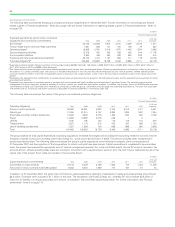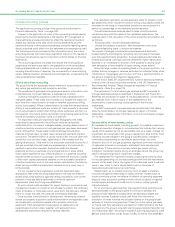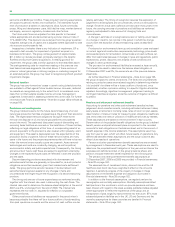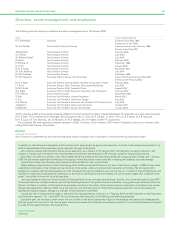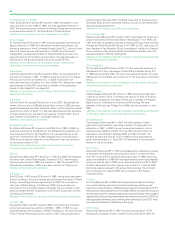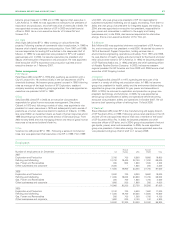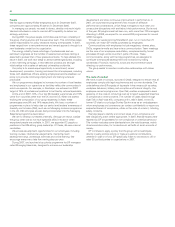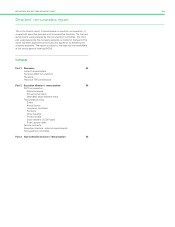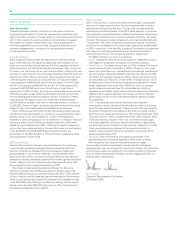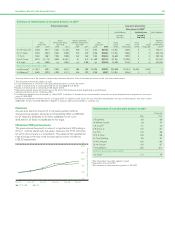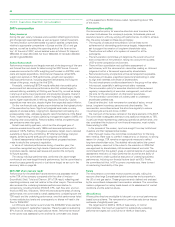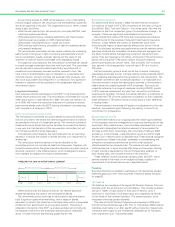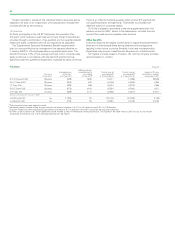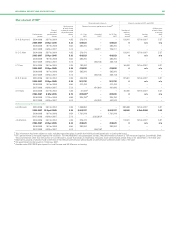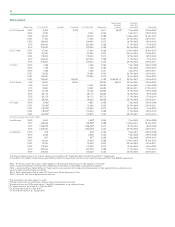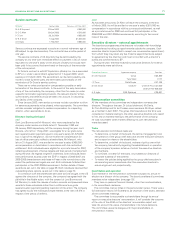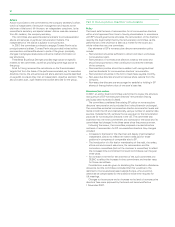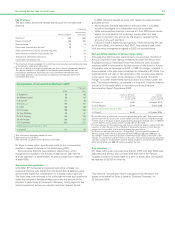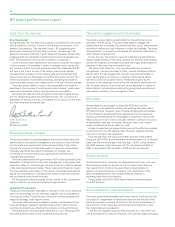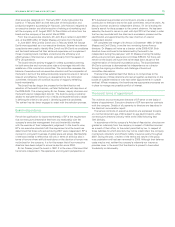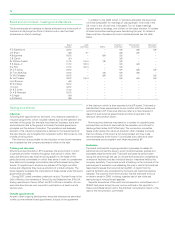BP 2007 Annual Report Download - page 68
Download and view the complete annual report
Please find page 68 of the 2007 BP annual report below. You can navigate through the pages in the report by either clicking on the pages listed below, or by using the keyword search tool below to find specific information within the annual report.
Part 2: Executive directors’ remuneration
2007 remuneration
Salary increases
During the year, salary increases were awarded reflecting promotions
and changed job responsibilities as well as regular market movement.
The remuneration committee seeks to position salaries competitively
relative to appropriate comparators in Europe and the US oil and gas
sectors, as well as to reflect the operating style of the ‘team at the
top’. At the end of 2007, annual salaries were as follows: Dr Hayward
£950,000, Dr Allen £510,000, Mr Conn £650,000, Dr Grote $1,300,000
and Mr Inglis £650,000.
Annual bonus result
Performance measures and targets were set at the beginning of the year
and formed the main basis for determining the 2007 bonus. Financial
measures accounted for 50% weighting and focused on EBITDA, cash
costs and capital expenditure. Non-financial measures carried 30%
weight and centred on HSE performance, growth and reputation.
Individual performance, including segment deliverables and living the
values of the group, made up the final 20%.
Financially, underlying EBITDA results reflected a favourable price
environment but also some performance shortfall, related largely to
reduced refining availability at Whiting and Texas City, as well as delays
in start-up of some major exploration and production projects. Overall it
was below expectation. Cash costs were marginally above plan, largely
due to higher expenditures in refining, especially Texas City. Capital
expenditure was near plan, despite higher than expected sector inflation.
On the non-financial side, safety was maintained as the highest priority
of the executive top team. Significant progress was made on many
aspects of process safety, ranging from development and testing of a
process safety index, addressing specific recommendations of the Baker
Panel, implementing a holistic operating management system (OMS) and
ensuring clear accountability. Personal safety metrics and greenhouse
gas emissions were also good.
Growth was led by upstream, which had the strongest year of
resource access since the early 1990s and reserves replacement in
excess of 100%. Refinery throughput was below target, due to reduced
availability at Texas City and Whiting. BP Alternative Energy met plan
targets, achieving some 40% growth compared with 2006.
External assessments indicate that significant progress has been
made to rebuild the company’s reputation.
In terms of individual performance during a transition year, the
committee recognized very high levels of personal and team effort
to produce results, resolve past issues and position the company
for future success.
The strong individual performances, combined with above-target
non-financial and near-target financial performance, led the committee to
award bonuses generally around or just above target, as set out in the
summary table on page 65.
2005-2007 share element result
Performance for the 2005-2007 share element was assessed relative
to the TSR of the company compared with the other oil majors –
ExxonMobil, Shell, Total and Chevron. BP’s TSR result, reflecting past
operating problems, was last relative to the other majors. The committee
also reviewed the underlying business performance relative to
competitors, including financial (ROACE, EPS, cash flow etc.) and non-
financial (HSE etc.) indicators. While this showed some areas of strong
performance, the committee’s overall assessment, considering both the
TSR result and the underlying performance, was that performance failed
to meet satisfactory levels and consequently no shares will vest in the
Plan for 2005-2007.
Lord Browne also held an award under the 2005-2007 share element
related to long-term leadership measures. These focused on sustaining
BP’s financial, strategic and organizational health. Performance relative
to the award was assessed by the chairman’s committee and, based
on this assessment, 80,000 shares vested, representing about 15%
of the award.
Remuneration policy
Our remuneration policy for executive directors aims to ensure there
is a clear link between the company’s purpose, its business plans and
executive reward, with pay varying with performance. In order to achieve
this, the policy is based on these key principles:
– The majority of executive remuneration will be linked to the
achievement of demanding performance targets, independently
set to support the creation of long-term shareholder value.
– The structure will reflect a fair system of reward for all the
participants.
– The remuneration committee will determine the overall amount of
each component of remuneration, taking into account the success
of BP and the competitive environment.
– There will be a quantitative and qualitative assessment of
performance, with the remuneration committee making an informed
judgement within a framework approved by shareholders.
– Remuneration policy and practice will be as transparent as possible.
– Executives will develop a significant personal shareholding in order
to align their interests with those of shareholders.
– Pay and employment conditions elsewhere in the group will be taken
into account, especially in setting annual salary increases.
– The remuneration policy for executive directors will be reviewed
regularly, independently of executive management, and will set
the tone for the remuneration of other senior executives.
– The remuneration committee will actively seek to understand
shareholder preferences.
Executive directors’ total remuneration consists of salary, annual
bonus, long-term incentives, pensions and other benefits. The
remuneration committee reviews this structure regularly to ensure
it is achieving its aims and did so in 2007.
The main part of the review centred on the share element of the EDIP.
The committee investigated alternative and additional measures to TSR,
in particular those representing underlying operational performance, and
also considered the inclusion of non-financial measures, most notably
those relating to HSE.
In the process of the review, input was sought from key institutional
investors and their representative bodies.
After thorough review, the committee concluded that, for the long-
term metrics, there was no ‘perfect’ measure and, on balance, no strong
reason for change. TSR remains an appropriate measure to reflect
long-term shareholder value. The detailed rationale behind the current
scoring system, as set out in the notes to the resolution in 2005 that
was approved by shareholders, still remained relevant and valid. The
committee felt that this system gives an optimal balance of quantitative
assessment relative to oil major performance as well as the ability of
the committee to make qualitative evaluation of underlying business
performance, including non-financial factors (such as HSE). Finally,
the committee felt that, in BP’s current circumstances, there is merit
in maintaining the stability of the plan.
Salary
The remuneration committee reviews salaries annually, taking into
account other large Europe-based global companies and companies in
the US oil and gas sector. These groups are each defined and analysed
by the committee’s independent remuneration advisers. The committee
makes a judgement on salary levels based on its assessment of market
conditions and the external advice.
Annual bonus
All executive directors are eligible to take part in an annual performance-
based bonus scheme. The remuneration committee sets bonus targets
and levels of eligibility each year.
The target level for 2008 is 120% of base salary. In normal
circumstances, the maximum payment for substantially exceeding
performance targets will continue to be 150% of base salary.
66


